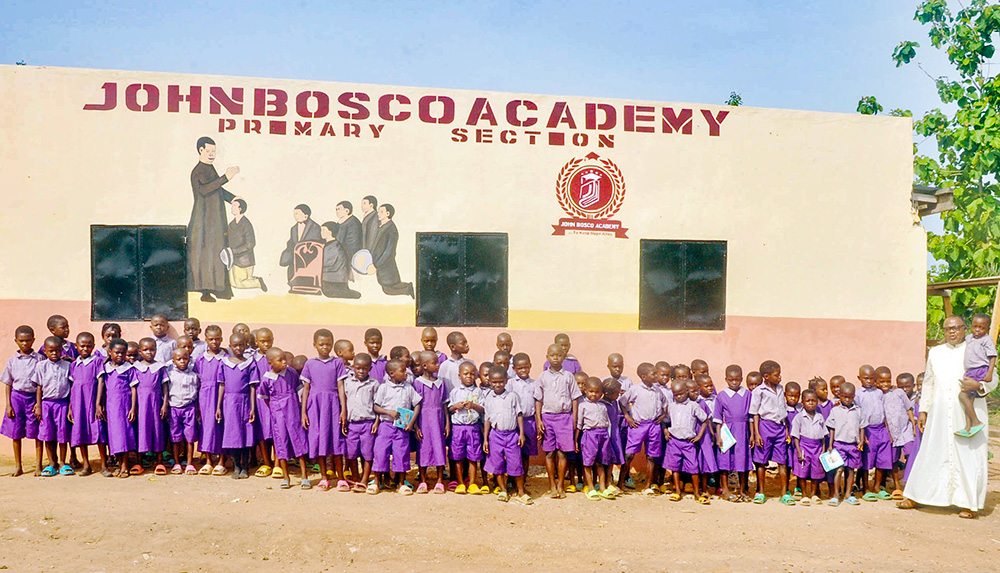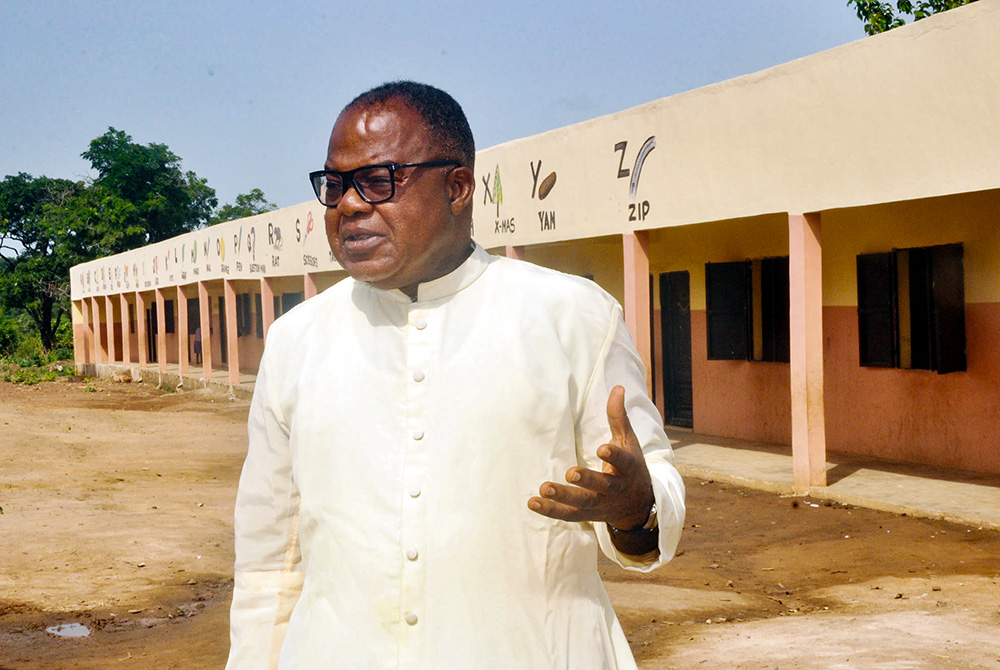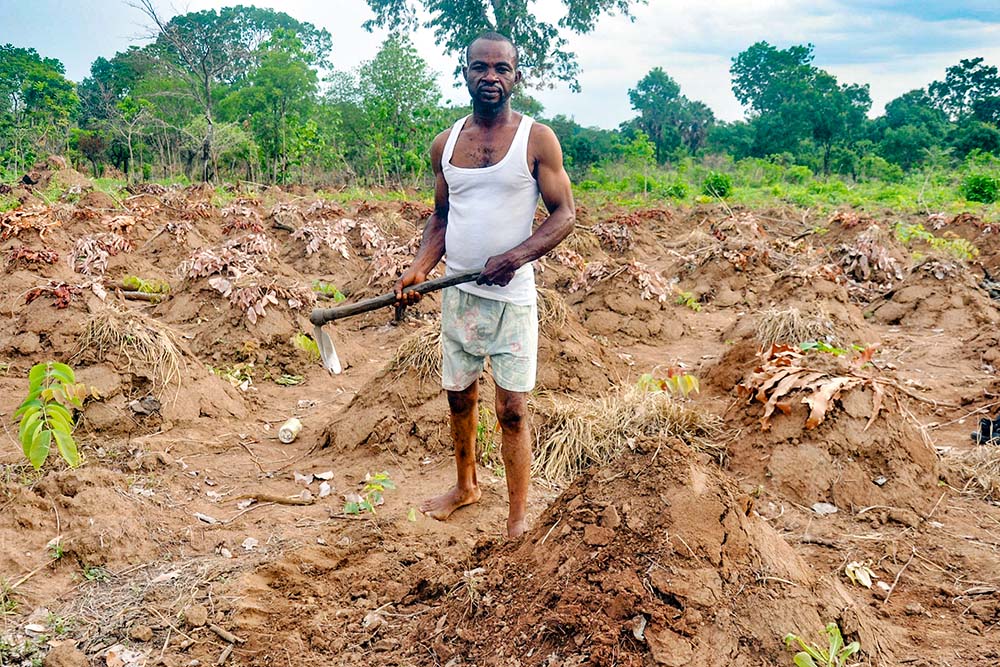
Elementary school pupils of John Bosco Academy, formerly St. Peter's Catholic School, in Ogoja, Cross River State, Nigeria, pose for a photo with Fr. Peter Abue, founder of the Children of Rural Africa initiative. (Valentine Benjamin)
Fr. Peter Abue, a Catholic priest in Ogoja in Nigeria's southern Cross River State, is trying to improve the lives of children and orphans in marginalized communities through a nonprofit initiative. Children of Rural Africa, referred to as CORAfrica, offers free education, shelter, health care, agricultural support, and economic development programs for those in need.
More than 10 million Nigerian children do not have the opportunity to attend school, which is the world's highest rate. The country's out-of-school population accounts for not less than 15% of the global figure, according to UNICEF.
Factors responsible for these grim statistics include lack of basic infrastructure and facilities, harsh economic climate, and unavailability of paid jobs, which has left thousands of parents struggling to pay for their children's education.
In 2022, 11-year-old Michael Joel was on the verge of quitting his elementary education in his hometown of Adagum, a small village. His father's meager earnings from a civil service job could no longer pay his school fees.
"It was a challenge that almost kept me out of school as my father's salary could no longer sustain us, and my mother being a farmer could not do much to save my education," Joel told NCR. "But since I started schooling here ... I have been enjoying free education."
Abue launched the CORAfrica initiative in 2006 to try to help fill the learning gap fueled by poverty. A 2022 Multidimensional Poverty Index survey revealed that more than 133 million Nigerians are multidimensionally poor.
Advertisement
"My main mission is to improve the lives of poor children who live in rural areas through education," said the priest. "Growing up, I was privileged to pursue my education up to a higher level. But then I noticed that most of my peers in our village could not have this privilege."
"Their parents did not encourage them because they could not afford the means," he said. "So, I decided to fill that gap through CORAfrica, whose main aim is to offer this education to the poorest of the poor and also involve their parents in this educational awareness by creating support systems for them."
The initiative has provided elementary education to more than 2,000 pupils with the opening of St. Joseph's Primary and Secondary School, a learning center in Mbube that caters to the numerous children in need. The school also serves as an orphanage for children from 5 years and above.
Abue explained to NCR that the school has now been handed over to the Ogoja Diocese.
Before CORAfrica's educational initiative, there were efforts by Catholic missionaries who came into southeastern Nigeria in the 1960s and founded primary schools, where local children could get a solid education.
Abue said his efforts build on these past initiatives. "Our mission is to encourage children and young people in rural and suburban communities to grow out of poverty through quality education and we do this by founding schools where the need is more," he said.
"Our vocational and skills acquisition centers will identify latent skills in our children and seek the best ways to encourage these children to study courses that will help them discover these skills for the future," said the priest.

Fr. Peter Abue, a Nigerian Catholic priest offering free education and empowerment to families in marginalized communities through the CORAfrica initiative, poses for a photo in front of John Bosco Academy, which he founded in 2020 in Ogoja, Nigeria. (Valentine Benjamin)
The initiative has different programs for different categories of persons. One is the Help-a-Kid Program, which offers scholarships to children through the provision of educational materials, and school uniforms to children who cannot afford them. Joel was a beneficiary of this program.
The nonprofit delivers this through what it calls the Community Education Center Model, whereby children are educated, while parents and guardians receive health care, agriculture and microcredit opportunities.
The nongovernmental organization runs different educational campuses — St. Joseph's Primary and Secondary School in Ogoja, and Little Flower Nursery and Primary School in Obudu.
In 2020, Abue founded the John Bosco Academy in Ogoja to help a high influx of refugee children from Cameroon who could not access basic and quality education.
The following year, he founded the John Stilley Schools in Victoria Village, Ikom, Cross River State, to cater to the educational needs of young people in the community, as no other high school existed in the area.
CORAfrica works in partnership with rural communities and religious institutions, especially Catholic parishes.
The organization also has an economic empowerment program called the St. Thomas Aquinas Parish Economic Empowerment Program, whereby parishioners access funds to engage in small- and large-scale business enterprises.
The initiative was started in 2022 with a total sum of $40,000 and was officially commissioned by Ogoja Bishop Donatus Akpan.

Leo Ugboji makes ridges on his yam and cassava farm behind Igoli Stadium in Ogoja, Cross River State, Nigeria. He received training in cultivation through a CORAfrica program. (Valentine Benjamin)
Leo Ugboji, a farmer who often loses his crops to perennial flooding in Ogoja, received training in rice and cassava cultivation, and in how to cultivate a broad variety of seedlings at different seasons through the program. CORAfrica acquired a vast piece of land and shared it among him and other farmers.
Ugboji says the training has exposed him to areas of agriculture he knew nothing about, including the administrative aspect of having to monitor and work with a group of people and increase his income base. "The other aspect is the mechanized way of doing it, using the power tiller or the tractor which we use to plow," he said.
"Without CORAfrica, the mechanized system of farming wouldn't have been possible for me, it made it more accessible for us to use," he told NCR. "The results are far better than what we achieve through the manual system."
Ada Okoli, another beneficiary and mother of four, was supported with funding to grow her plastic bag business. Okoli has benefited twice from the program; she says her business has now grown into both a retail and wholesale business
"I was given a 150,000 naira loan ($100) when I subscribed to the program for the first time to grow my business in 2022, I invested it in the business which has now grown and expanded into both wholesale and retail business, thereby improving my ability to meet living costs at home," she said.
So far, more than 500 women have been supported through the provision of soft loans and grants to support their families to live healthy lives.







